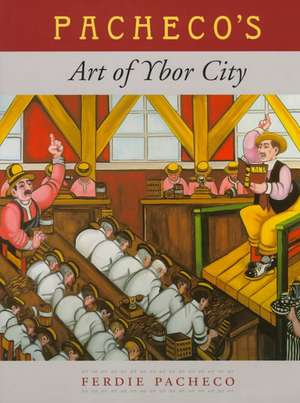Pacheco's Art of Ybor City
Autor Ferdie Pachecoen Limba Engleză Hardback – 31 aug 1997
Preț: 340.92 lei
Nou
Puncte Express: 511
Preț estimativ în valută:
65.24€ • 69.76$ • 54.39£
65.24€ • 69.76$ • 54.39£
Carte indisponibilă temporar
Doresc să fiu notificat când acest titlu va fi disponibil:
Se trimite...
Preluare comenzi: 021 569.72.76
Specificații
ISBN-13: 9780813015170
ISBN-10: 0813015170
Pagini: 68
Dimensiuni: 225 x 288 x 14 mm
Greutate: 0.69 kg
Ediția:New.
Editura: University Press of Florida
ISBN-10: 0813015170
Pagini: 68
Dimensiuni: 225 x 288 x 14 mm
Greutate: 0.69 kg
Ediția:New.
Editura: University Press of Florida
Textul de pe ultima copertă
Ferdie Pacheco has done it again. In Ybor City Chronicles (UPF, 1994) he brought to life the immigrant utopian that was Tampa's Ybor City in his childhood. In The Columbia Restaurant Spanish Cookbook (UPF, 1995), he and coauthor Adela Hernandez Gonzmart created something more than a cookbook, highlighting the recipes, history, and personalities behind of one of America's most famous Spanish restaurants. Now, in Pacheco's Art of Ybor City, the Renaissance man and bon vivant best known as Muhammad Ali's "Fight Doctor" - a man who has also worn the hats of family physician, Emmy Award-winning boxing commentator, historian, playwright, screenplay writer, and author of five books - here offers 33 of the paintings that have established his reputation as an artist. In these full-color reproductions we see the Ybor City of the 1930s and '40s (and earlier) that inspired Pacheco from the beginning. With the same flare and storyteller's gift evident in Ybor City Chronicles and The Columbia Restaurant Spanish Cookbook, he narrates the unpredictable course of his development as an artist and tells the story behind each printing in this collection. In the bright muralist-style colors that have become his stock-in-trade, Pacheco renders a storehouse of memories too vivid ever to grow dull. So long as he has hold of us, there is no Ybor City more real than this one - with its cigar factories, palm trees, bolita gangsters, trolley cars, clubs and diners and cafes, and the Spaniards, Cubans, Sicilians, and oddball personalities who walk its redbricked streets.
